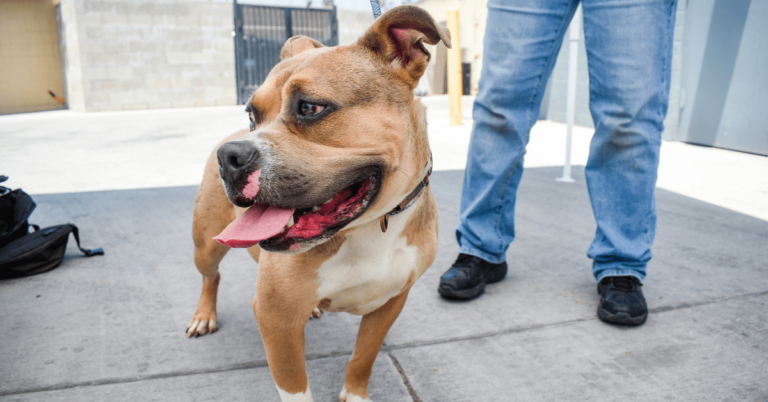Runny Noses and the Difference Between a Cold and the Flu


This article contains affiliate links. Found Animals receives a portion of the proceeds from every purchase made after clicking on the links. These profits go toward saving more homeless animals!
Wintertime is perfect for cuddling up under a warm blanket, watching the snow fall and… wiping snot off your face?! Yup, it’s flu season! And when your pup or kitty gets a runny nose, it probably gets you worried. Is it just a simple cold or is it the flu? Should you be worried? Does it warrant a trip to the vet? Here’s our guide to the difference between a cold and the flu!
Dog Colds
Several viruses and bacterial infections present symptoms in dogs that resemble the common cold in humans. These illnesses include canine adenovirus type 2, Bordetella bronchiseptica, canine parainfluenza virus and canine respiratory coronavirus. Symptoms include sneezing, coughing, watery eyes, congestion, a runny nose and just acting slightly different than normal, such as less playful or energetic.
Anytime your pup shows signs of abnormal behavior or illness, it’s a good idea to call the vet. With a mild cold, you might not even have to make an appointment and can treat the illness at home. If your dog is still fairly active and taking in food and liquids as normal, your vet might tell you to try at-home treatments.
These treatments are similar to how you would take care of a person who has a cold. Encourage your pup to rest, drink water and eat. Wipe their runny eyes and nose with a damp cloth or special wipes. We recommend the wipes since they’re pH-balanced and gentle on sensitive skin. You can also use a humidifier to help with your dog’s congestion. We also like to use Mrs. Meyer’s cleaning products for any messes.
Note: Do NOT give your pup any cold medicine or cough suppressant without first consulting your veterinarian. If at any time your dog’s symptoms worsen, your dog stops eating and drinking normally, appears uncomfortable, has labored breathing or fails to get better within two weeks, immediately contact your veterinarian.
Cat Colds
Cats can also get colds. Various causes are feline calicivirus, Bordetella bronchiseptica, mycoplasma, feline viral rhinotracheitis and chlamydophila felis. Cold symptoms in cats are also similar to those in humans and include watery eyes, fever, runny nose, sneezing, loss of appetite and fatigue. Cat colds can last anywhere from one to four weeks depending on when they’re diagnosed and treated.
Contact your veterinarian as soon as you see any cold symptoms. Early detection and treatment will help shorten the duration of the illness. Also be on the lookout for severe symptoms, such as labored breathing, a decrease in eating or drinking or an increase in eye discharge, nasal discharge and lethargy.
While you should immediately call your veterinarian when you think your pet is sick, there are also things you can do at home to make your cat more comfortable. Kitties have difficulty grooming themselves when they have a cold so massage your cat’s mouth and nose with a washcloth or wipe. You might also want to use an infant’s bulb syringe to pull snot out of your pet’s nose. Lastly, try using a humidifier to help with your cat’s congestion.
Dog Flu
There are two Influenza Type A strains of dog flu: H3N2 and H3N8. Most affect the respiratory system and are extremely contagious. Some dogs might become very ill, while others can fight off the virus without getting sick. However, vaccines are available for both strains so you shouldn’t take any chances. Always keep your pup up to date on their vaccinations!
Dog flu can manifest as either mild or severe syndromes. As soon as your dog shows any symptoms of either syndrome, you should call your veterinarian. Dogs with a mild flu will generally have a moist cough and nasal discharge. Sometimes pups will have more of a dry cough. Symptoms last 10 to 30 days.
Dogs with a severe flu will develop symptoms very quickly. They get a high fever of more than 104 degrees Fahrenheit and can get pneumonia or other secondary infections as well. Dogs might also cough up blood and experience difficulty breathing.
Other symptoms of both syndromes include:
- Sneezing
- Lack of appetite
- Malaise
- Runny nose
- Red eyes
Mild dog flu is typically treated with cough suppressants. If there is a secondary infection, like pneumonia, the dog might also be treated with antibiotics. Rest and being kept apart from other dogs is also super important. Severe dog flu requires more aggressive treatment, including fluids, broad spectrum antibiotics and supportive care. Hospitalization might also be required, since severe dog flu can be fatal.
Cat Flu
Cat flu can be caused by a variety of viruses and certain types of bacteria. The vaccine can prevent some, but not all, strains of the virus. Adult cats can become quite ill while the illness can be even more serious or even fatal in kittens or adult cats with other health issues. If your cat shows any signs of cat flu, you should call your vet ASAP.
Cat flu symptoms include:
- Sore muscles
- Achy joints
- Mouth ulcers
- Drooling
- Sneezing
- Loss of voice
- Fever
- Runny nose
- Watery eyes
- Sore throat
- Eye ulcers
- Lack of appetite
Cats infected with the virus might also become ill with a secondary infection, such as pneumonia. In cases such as these, they will be treated with antibiotics. Taking care of the cat at home is also important. A blocked nose and mouth ulcers might lead to a lack of eating and drinking, so water and strong-smelling food should be offered. Cats that cease eating will likely be hospitalized. Otherwise, treat the flu similarly to how you would a cold with rest, a humidifier and wipes to help with grooming.
The moral of the story is to always keep your pets up to date on their vaccines. If you know of any sick pets in your home, keep them separate from your other animals. And of course as soon as your pet shows any symptoms of a cold or the flu, call your veterinarian immediately.



